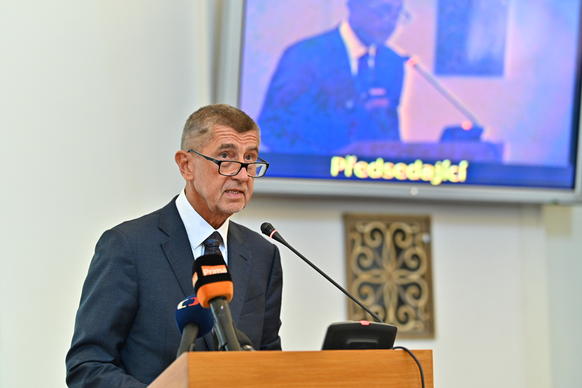The European Commission has fined the Czech Republic more than CZK 85 million for errors related to agricultural subsidies. This also includes sanctions for the conflicts of interest of former Prime Minister Andrej Babiš (ANO) for which the Czech Republic must pay roughly CZK 1.1 million. Photo: opening speech of the meeting of ambassadors at the Černín Palace in 2019. Credit: vlada.cz
Czech Republic, June 14 (BD) – The news was reported by Czech news server iROZHLAS. Babiš told ČTK that he could not comment on the matter because he did not know the details and had no information that the document was in any way related to him. He added that he has never been in a conflict of interest. The Agrofert holding, which Babiš placed into trust funds, has always maintained that the former Prime Minister acted in accordance with Czech and EU rules.
“I can confirm that the Commission’s decision on the audit investigation, which has been ongoing since 2019, has been published. The implementing decision provides for the exclusion of certain expenses, such as the subsidy provided for the project investigated for conflict of interest,” said Luďka Raimondová, the head of the press department of the State Agricultural Intervention Fund (SZIF).
The Czech Republic can appeal the decision to the EU Court of Justice within two months. The agriculture ministry did so this year in the case of a CZK 1.15 billion fine imposed by the Commission for errors in the distribution of subsidies dating back five years. “The Fund has worked out options for further action. It is now awaiting the approval of a specific option according to which it will proceed,” added Raimondová.
The audit on Babiš’s conflict of interest took place in the Czech Republic in early 2019. The former prime minister has long denied wrongdoing. Agrofert told the Czech News Agency today that no proceedings have been opened against the company. “This is an audit of the Czech Republic, not of Agrofert. Therefore, we have not received any decision and we have information only from the media,” said Agrofert spokesman Pavel Heřmanský.
SZFI suspended projects of Agrofert’s subsidiaries worth about half a billion crowns because of the audit. European subsidies were supposed to cover about two-fifths of the costs. The company does not see any reason to return the subsidies. “We must strongly oppose the idea that the sanction was caused by the actions of our companies and we believe that the Czech Republic will defend itself against this decision in court. As SZIF announced earlier, it has stopped reimbursing subsidies to Agrofert Group companies, so it is not clear to us how the sanction could be imposed for projects that have been suspended,” Heřmanský added.
The European Commission has already taken several proceedings against the Czech Republic. In April 2007 it fined the Czech Republic EUR 12.3 million for allegedly having excessive pre-positioned stocks of certain agricultural and food products. In June 2013, the European Court of Justice fined the Czech Republic EUR 250,000 (just under CZK 6.5 million) for late transposition of a European Union directive on pension insurance for employees. The court’s advocate general Niilo Jääskinen had originally proposed a fine of up to EUR 1 million euros, while the European Commission had demanded a fine of EUR 3.4 million.
On the other hand, in August 2018, the European Commission decided that the Czech Republic would not pay a fine due to a possible conflict of interest on the supervisory board of the State Agricultural Intervention Fund (SZIF) of MP Jaroslav Faltýnek (ANO) and former MPs Ladislav Velebný (ČSSD) and Petr Kudela (KDU-ČSL). Originally, the Commission had threatened to recoup some CZK 22 million that it had demanded from the Czech Republic.
In September of the same year, the Czech Republic succeeded in a case before the EU Court of Justice for about CZK 55 million. The court overturned a 2015 EC decision that required the Czech Republic to repay a €2,123,199 (CZK 55 million) subsidy. The reason for the repayment of the subsidy was allegedly the erroneous disbursement of agricultural funds to winegrowers to protect vineyards from game and birds.







